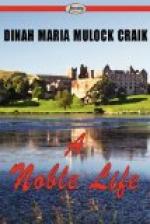It was on a June day—ten years after that bright June day when the minister of Cairnforth had walked with such a sad heart up to Cairnforth Castle, and seen for the first time its unconscious heir—the poor little orphan baby, who in such apparent mockery was called “the Earl.” The woods, the hills, the loch, looked exactly the same—nature never changes. As Mr. Cardross walked up to the Castle once more—the first time for many months—in accordance with a request of Mr. Menteith’s, who had written to say the earl was coming home, he could hardly believe it was ten years since that sad week when the baby-heir was born, and the countess’s funeral had passed out from that now long-closed door.
Mr. Cardross’s step was heavier and his face sadder now than then. He who had so often sympathized with others’ sorrows had had to suffer patiently his own. From the Manse gate as from that of the Castle, the mother and mistress had been carried, never to return. A new Helen— only fifteen years old—was trying vainly to replace to father and brothers her who was—as Mr. Cardross still touchingly put it— “away.” But, though his grief was more than a year old, the minister mourned still. His was one of those quiet natures which make no show, and trouble no one, yet in which sorrow goes deep down, and grows into the heart, as it were, becoming a part of existence, until existence itself shall cease.
It did not, however, hinder him from doing all his ordinary duties, perhaps with even closer persistence, as he felt himself sinking into that indifference to outside things which is the inevitable result of a heavy loss upon any gentle nature. The fierce rebel against it; the impetuous and impatient throw it off; but the feeble and tender souls make no sign, only quietly pass into that state which the outer world calls submission: and resignation, yet which is, in truth, mere passiveness—the stolid calm of a creature that has suffered till it can suffer no more.
The first thing which roused Mr. Cardross out of this condition, or at least the uneasy recognition that it was fast approaching, and must be struggled against, conscientiously, to the utmost of his power, was Mr. Menteith’s letter, and the request therein concerning Lord Cairnforth.
Without entering much into particulars—it was not the way of the cautious lawyer—he had stated that, after ten years’ residence in Dr. Hamilton’s house, and numerous consultations with every surgeon of repute in Scotland, England—nay, Europe—it had been decided, and especially at the earnest entreaty of the poor little earl himself, to leave him to Nature; to take him back to his native air, and educate him, so far as was possible, in Cairnforth Castle.




